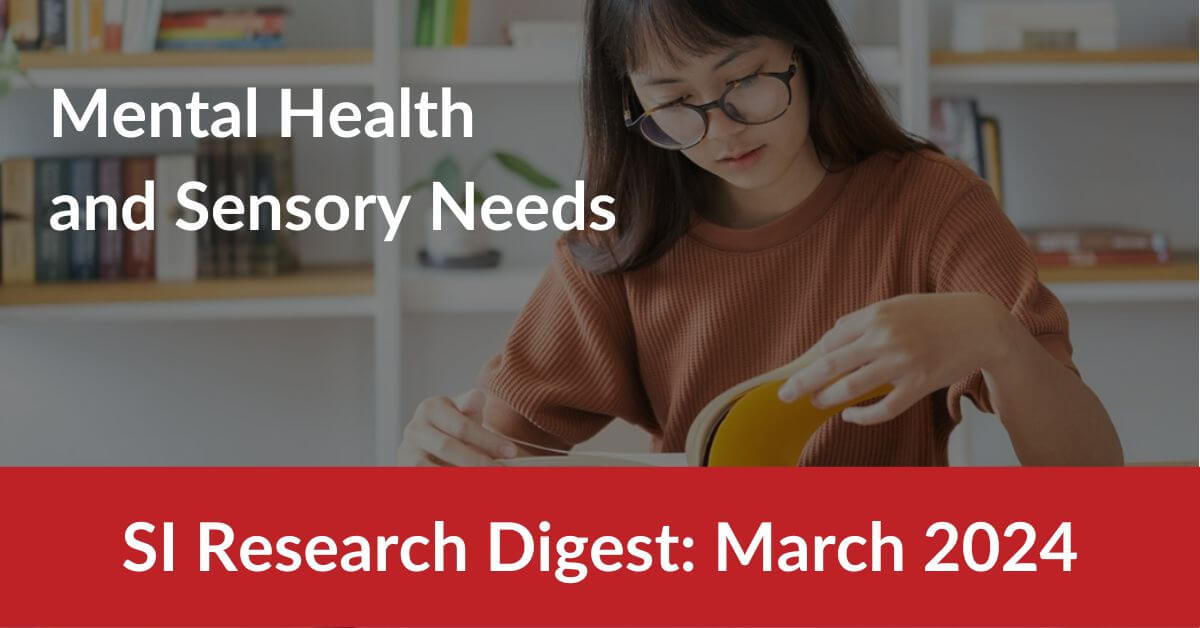SI Research Digest March 2024: Mental Health and Sensory Needs
By Sensory Integration Education, 26 Feb 2024

Each month we take a look at the latest SI research and research of topical interest - this month, we have a focus on mental health and sensory needs.
White Matter Microstructure of Children with Sensory Over-responsivity Is Associated with Affective Behavior
This new study investigated the neuroscience behind the affective behaviour of children who are over-responsive to sensory input. Using standardised tests and MRI scans, the research team found differences in white matter microstructural integrity in participants who present with sensory over-responsivity that explain differences in affective behaviour, particularly emotional disturbance in the form of depression and withdrawal.
Properties of Imagined Experience Across Visual, Auditory, and Other Sensory Modalities
This new study investigated the properties of imagined experience across sensory modalities. The researchers found that of all sensory modalities, visual and auditory mental imagery were most common in study participants.
How Developmental Coordination Disorder Affects Daily Life: The Adolescent Perspective
This new qualitative study investigated adolescents' perspectives on how Developmental Coordination Disorder (DCD) impacts their daily lives. The researchers found that DCD impacted participants' overall well-being and that young people with DCD are often misunderstood, under-prioritized, and not receiving care despite the challenges that they experience as a result of DCD.
Sensory Differences and Mental Health
In this article, Dr Teresa Tavassoli, Associate Professor in the School of Psychology and Clinical Language Sciences at the University of Reading, discusses three interlinked studies conducted by her research group over recent years which looked how sensory processing differences can impact on the mental health of autistic children and young people:
- Study one: The relationship between sensory reactivity differences and anxiety in autistic children
- Study two: The relationship between sensory reactivity, intolerance of uncertainty and anxiety in preschool-age autistic children
- Study three: The relationship between sensory reactivity differences and mental health symptoms in preschool‐age autistic children
Sensory Health among Older Adults in the United States: A Neighborhood Context Approach
This new study investigated the impact of the environment on the sensory health of older adults. The researchers found that neighbourhood characteristics influenced self-rate visual processing along with olfactory processing in study participants.
Atypical Sensory Processing in Adolescents with Attention Deficit Hyperactivity Disorder: A Comparative Study
This new study investigated sensory processing in adolescents with ADHD. The researchers found that in comparison to a control group with no ADHD, participants with ADHD showed a higher prevalence of sensory processing differences in all domains of the Sensory Profile.
Sensory Processing in Children with Paediatric Acute-onset Neuropsychiatric Syndrome
This new study investigated sensory processing differences in children with Paediatric Acute-onset Neuropsychiatric Syndrome (PANS). The researchers found that children with PANS experienced atypical sensory reactivity, both during exacerbations, but also during remission periods which impacted their ability to carry out daily tasks.
Sensory Symptoms Associated with Autistic Traits and Anxiety Levels in Children Aged 6–11 Years
This new study investigated sensory processing differences associated with anxiety in autistic children The researchers found that over-responsivity to auditory and olfactory sensory input were predictive of heightened anxiety in study participants.
Tips for Making Music Performances Sensory-Friendly and Inclusive
This recent paper discusses how music performances can be made more sensory-friendly. Whilst major arts organizations and other large-scale public venues are adopting a “sensory-friendly” approach to make it easier for individuals with sensory sensitivities to participate in social activities and community events, similar efforts are rarely seen occurring in school-based music performances. This paper shares five tips that may help people feel more confident implementing something similar in their school.
The Characterization of Feeding Challenges in Autistic Children
This new study characterised feeding challenges in 427 autistic children based on a survey of caregivers. The researchers found a high prevalence of sensory over-responsivity with 84.5% of reporting sensitivity to the texture of foods, 61.8% reporting sensitivity to taste and 56.9% reporting sensitivity to the smell of foods.
Tactile Cues Are More Intrinsically Linked to Motor Timing than Visual Cues in Visual-tactile Sensorimotor Synchronization
This new neuroscience study investigated tactile and visual sensory processing during sensorimotor synchronisation tasks. The researchers found that tactile cues played a more significant role than visual cues in the performance of sensorimotor synchronisation tasks.
Pilot Study on Classification of Sensory Symptoms in PTSD
This new study investigated sensory processing differences in individuals who have post-traumatic stress disorder (PTSD). The researchers found hypersensitivity in a number of domains for study participants and highlighted the importance of learning about the sensory needs or differences in individuals who have PTSD in order to support them.
| If you’re looking to expand your knowledge of sensory integration and sensory processing, SIE’s Lifelong Learning Programme offers access to all our short courses as well as peer support sessions. Find out more here. |

